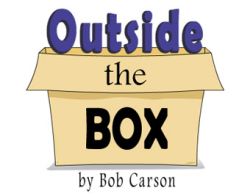The Night Shift
November 20, 2017,by Bob Carson
Editor’s Note: The USTA website is pleased to present freelance writer Bob Carson and his popular “Outside the Box” features. This monthly series is a menu of outlandish proposals presented with a wink — but the purpose behind them is serious. The views contained in this column are that of the author alone, and do not necessarily represent the opinions or views of the United States Trotting Association.

Bob Carson
You have a new job. Monday morning, you begin work as the general manager of a harness racetrack. Regrettably, the racetrack you will control does not have the benefit of slot machine revenue. This makes your task akin to operating a Blockbuster Video rental franchise or releasing a new polka album on a 78-rpm vinyl record.
After a week of data analyzing and perhaps undergoing personal analysis for agreeing to such a career move, obstacles loom. Incremental improvements will not get your racetrack to fiscally green pastures. It is painfully clear that your success or failure will depend on the revenue stream you can generate via internet gambling for the rather exotic gambling product of harness horse racing.
You have a minimum of six racetracks competing for online business. These competitors often appear on the same dates in the same time slot. You must somehow battle your way up the wagering ladder against rather stiff competition — Or maybe not.
You have an idea that springs from a previous job. Fifteen years ago, you worked as a radio DJ. You hosted the midnight shift at WIXY radio 97.2 FM. Your experimental idea for the harness racetrack is very simple — you will switch the post time of your first race from 7 p.m. to midnight.

When you worked in radio land, the seven to midnight gig was basically dead air. Disc jockeys knew that it was better to be on the air very early or very late as you worked to create a loyal audience. You preferred the night shift because after reality TV was over and all family and social obligations were paid, listeners were much more likely to tune in.
If your racetrack carved out a niche during the midnight hours, progress might be possible. More than just running races in a different time slot, you have bigger ideas. You want to find a host who can find night owls. If he (or she) does the job, you will tie pay to ratings. The night slot offers the opportunity to garner a band of gamblers, allow your host to have a more personal touch, establish a brand, inspire loyalty, and allow experimentation with new approaches. Many interesting things happen in the dark.
Instead of rambling on about concepts such as supply and demand, you, as the author of this unorthodox approach, decide to make a list of bullet points. Points you can take to your bosses that might encourage them to consider this shift to racing during the graveyard shift. You will present a new plan for an old game. A new niche for a niche sport.
Reasons to hold harness races beginning at midnight:
- Other sporting events will be idle
- Money does not sleep
- Midnight is not late to many
- The field will be clear
- Your competitors will be sleeping
- You can eliminate time and money spent on live attendance, from now on you are a “studio sport”
- Casinos never close
- The Late Shows and Late, Late Shows are profitable
- Current harness racing junkies may be looking for a fix in the present void of racing after midnight
- A captive audience is a good audience
- A good host could do what good late night voices do — keep talking, keep company with the night owls and slowly generate a loyal following during the traditional void between races
- Horses do not wear wristwatches
- Insomniacs have bank accounts
- Gamblers will find fewer distractions from bosses, spouses and children
- Midnight in Michigan is prime time in Los Angeles
- The slow pace of a race program gives the announcer time to build an audience. He will now be your friendly voice in the night and a syrupy, folksy rambling between races will be comforting
- The Insomniac Pace or Sleepless in Seattle Trot could draw interest
- Does anyone really need eight hours of sleep?
- Workers on the other graveyard shifts can blithely gamble away their paychecks while on the job
- Traffic will be very light shipping in and out of the racetracks
- Studies show that more than 23 percent of workers do not work the day shift and the cellphone and cyberspace continue to add to the demand for round-the-clock workers
- Late night is more languid. Hosts could introduce the intricacies of handicapping to new visitors at a slower and more personal pace
In today’s global economy, many of us live within driving distance of a 24-hour Wal-Mart or grocery store. There is a growing universe of third shift workers. What prevents harness racing from being a part of this universe?
Would a new time slot be a viable benefit? Would a soothing voice and face in the night inspire followers? Perhaps a late time slot has previously had a test run, but the world changes very rapidly these days and the data would soon tell the story.
After all, many have found being the only lad or the only lass in a bar after midnight always makes one’s prospects brighter.
